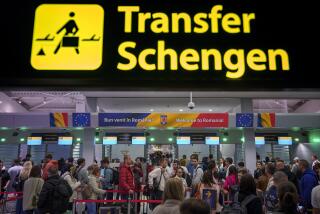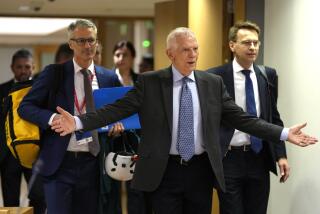From the archives: Policy Called ‘Gorbachev’s Best Bet’
BONN -- The Soviet Union, after decades of costly pursuit of superpower status, took a significant step this week toward reintegrating itself politically, economically and culturally with the European continent.
Soviet President Mikhail S. Gorbachev, pledging with West German Chancellor Helmut Kohl that their countries would work together to develop “a peaceful European order,” made clear Moscow’s preference for a place in the “common European home,” as he put it, over the role of a superpower with global interests.
“Although the continent has been divided for decades, the awareness of Europe’s identity and common assets has endured and is becoming ever stronger,” the two leaders said in a joint declaration. “This development must be encouraged.
“The Soviet Union and the Federal Republic of Germany consider it a paramount objective of their policies to continue Europe’s historical traditions and thus contribute towards overcoming the division of Europe. They are resolved to work together in the search to develop a Europe of peace and cooperation--a peaceful European order, a common European home. . . .”
The Soviet Union hopes that such efforts will end its long isolation from the political coalescence and the economic development that have brought Western Europe such stability and prosperity and now threatens to leave Moscow and its allies in Eastern Europe behind completely as the European Community moves to establish a unified market in 1992.
“Gorbachev realized--and it took much insight and integrity to do so--that the Soviet Union had lost in the arms race to the United States, was losing in the economic race to Japan and the European Community and would become a third- or fourth-rank power in 20 or 30 years,” a senior European ambassador said in Moscow recently. “The Russian fear is that they will be thought of as Asians, irrelevant to Europe, and just forgotten as we move ahead.
“Gorbachev’s best bet, politically and economically, was to return to Europe if the Soviet Union has any chance of keeping up. But that means ending the old thinking of ‘We are bigger and stronger than you’ or ‘We have a better system than you,’ and it means more than slogans about peace, friendship and cooperation. If the Russians want a place in Europe, they will have to earn it.”
In West Germany, however, Gorbachev found a partner willing--more than Britain and France so far have been--to respond to Soviet needs and accept Moscow’s desire to participate in shaping the Europe of the 21st Century.
“The ‘division of Europe’ has a special meaning here,” a senior West German official remarked Wednesday, “and while Kohl understands something different from what Gorbachev means when he says it, there is enough common ground for us to cooperate.”
A political commentator put it more tartly on West German television Wednesday: “Mikhail Gorbachev was looking for a solid boulder to be his anchor while he winched the Soviet Union into political and economic modernity, and Helmut Kohl said the Federal Republic of Germany would be that boulder.”
In return, the Soviet Union has already begun to soften its opposition--adamant and often angry in the past--to the possible reunification of East and West Germany. Talking with journalists after signing the joint statement, Gorbachev said of that issue, “Let time decide.”
“I think that the world is changing, and changing for the better,” the Soviet leader said, “and it is opening possibilities for better contacts between all states.
“If we are wise and far-sighted, then a good number of profound changes can take place in Europe and in the whole world.”
In October, Gorbachev had bluntly told Kohl in Moscow that even talking about reunification was dangerous, for it threatened Europe’s postwar stability.
And one Soviet specialist on Europe, Vladislav Belov, went as far last week as to suggest that he could see growing cooperation between socialist East Germany and capitalist West Germany leading to a decision by them--as “two independent and sovereign states”--on some sort of reunification.
The Berlin Wall, Belov added, would then be little more than a museum piece if it still existed.
“As a symbol, I believe the Wall will be destroyed sometime,” he told a briefing at the Foreign Ministry in Moscow.
On this trip, Gorbachev emphasized that, in signing what has already become known as the “Bonn Declaration,” “we are drawing a line on the postwar period . . . (and taking) a decisive step in the direction of one another.”
For the Soviet Union, the joint statement signed by Gorbachev and Kohl does mark a substantial change in the way it views the world--and itself.
As one of the fundamental shifts in Soviet strategy under Gorbachev, the decision reflects a harsh appraisal by the Soviet leadership of the country’s problems and capabilities, according to senior Gorbachev advisers.
“We inherited an empire and made it even grander, but we cannot afford it or even run it,” one top Soviet foreign policy specialist said here, explaining the reorientation of his country’s strategy. “Today, our people realize that, until we build our own country and make it strong within, anything we do abroad will be little more than an adventure. . . .
“But, if we are not to be a superpower, then what are we? First of all, we are a European country--not a small one, perhaps even a great one, but definitely a European nation. So, let us find our place in Europe.”
Moscow, which until a year ago refused to recognize the European Community, although its 12 members were reshaping the continent, accepts now that its future in Europe requires active cooperation with the community and with the larger Council of Europe, which it had also long disdained.
The joint efforts pledged by Gorbachev to elaborate with Kohl and other European leaders new concepts of cooperation will give a Soviet foreign policy a different and, in some ways, a tighter focus so that European concerns become far more prominent.
“These are relations between great powers,” Vitaly V. Zhurkin, director of the Soviet Institute of Europe, said in appraising the Soviet-West German summit--diminishing the Soviet Union as he elevated West Germany a bit.
Moscow realizes, of course, that its international responsibility will continue, senior Soviet foreign policy specialists say. Soviet military power remains second only to that of the United States, and arms reduction agreements will require time to negotiate.
The Soviet Union is also a major Asian nation, facing Japan and bordering on China, and these interests must be balanced with the new emphasis on Europe.
“We will have a European focus and an Asian focus and a special relationship with the United States,” a Soviet political commentator with the Gorbachev delegation remarked, “but the chronic overreaching of the past has ended.”
Moscow is hoping, however, that a significant improvement in relations with the West as a whole will follow.
“Our relations with West Germany will go a long way toward shaping Europe for the rest of this century and well into the next,” Georgy A. Arbatov, director of the Soviet Institute for Study of the U.S.A. and Canada, said here. “This will also have a substantial impact, we believe, on Soviet-American relations.
“We should recall that when something happens in our relations with West Germany, it signifies a turn for the better, as happened with our peace treaty in 1970, or for the worse. There is a strong movement for global changes that are ripe, or even overdue, and this development should help them.”
Changes in domestic policies are also implicit as the Soviet Union seeks to re-establish itself as a European country and no longer emphasizes the socialist character of its political and economic system.
After dismissing the democracies of Western Europe as “bourgeois” or even political shams for many years, the Soviet Union has committed itself to a political order in the Bonn Declaration that enshrines their most basic ideals.
With its own economic system evolving away from central planning toward “market socialism,” the Soviet Union is actively seeking assistance from West Germany and other capitalist countries not just to develop its backward economy but to train market-oriented managers to run it.
“The future is economic integration, not isolation,” an economist in the Soviet delegation said. “We thought central planning could do it all, and we were wrong. We thought that by relying on our own resources we could grow faster and become stronger, and we were wrong. And, quite foolishly, we thought we should protect our ‘socialist purity’ from contamination by the market.”
Although Soviet ideologists had long claimed that socialism had created a “new Soviet man” and a “new Soviet culture,” both superior to anything in the West, the country will now be seeking to re-establish what was European in its traditions as a basis of ensuring the country’s reintegration into Europe.
More to Read
Start your day right
Sign up for Essential California for news, features and recommendations from the L.A. Times and beyond in your inbox six days a week.
You may occasionally receive promotional content from the Los Angeles Times.






